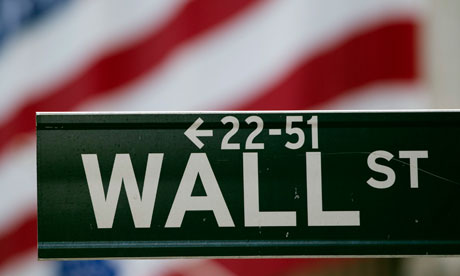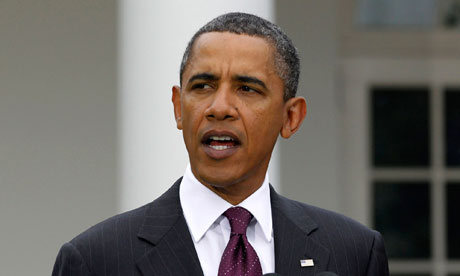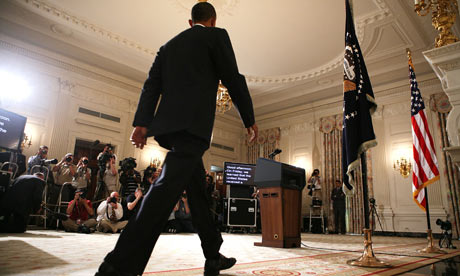
A Wall Street sign in front of the New York stock exchange. Recent events have changed the US as an unassailable economic superpower. Photograph: Lucas Jackson/Reuters
When India joined China in criticising the United States' chaotic handling of its hefty debts this weekend, describing the challenges facing the White House as "grave", it was the clearest indication yet that the old order had been swept away.
Until recently the US was the unassailable economic superpower, and the prospect of the White House being bossed about by the bond markets – let alone by Beijing or New Delhi – was unthinkable.
But following a week when an estimated $3tn (£1.8tn) was wiped off the value of world shares, Friday's downgrade of America's cherished AAA rating to AA+ by Standard & Poor's is set to cause more turmoil on global markets and potentially jeopardise Europe's attempts to solve its ownfinancial crisis.
With currency markets, particularly the dollar, expected to come under pressure, and US bond yields almost certain to rise, this could have the knock-on effect of raising borrowing costs in the eurozone at a time when Spanish and Italian bonds in particular have seen yields soar.
This could prove to be a tipping point for the transfer of global power from the US to its great rival China, even though the fortunes of Asia and the west are inextricably linked.
The boom of the past two decades in the US, the UK and much of Europe came at the expense of an extraordinary growth in borrowing, much of it from the Chinese and other fast-growing Asian economies, which were happy to keep piling up Treasury bills and buying blue-chip companies, so long as the billions of dollars they spent were recycled into cheap consumer goods.
At the height of the credit crunch, it seemed both lenders and borrowers were finally getting their comeuppance, but as the Bank of England governor, Mervyn King, has repeatedly pointed out in the past 12 months, the "global imbalances" that led to the crisis – the vast trade deficits and debts – never went away.
Gerard Lyons, chief economist at Standard Chartered, blames the turmoil of recent days on a combination of "ineffective policymakers, excitable markets and a realisation that the recovery is going to be very slow in the west".
David Blanchflower, a former member of the Bank of England's monetary policy committee, went further: "What we've seen is a once-in-100-years financial crisis that will take 20 years to adjust to."
As for the US itself, Alan Greenspan, the former Federal Reserve chairman, said on NBC that the downgrade was having a salutary effect on the public as well as on policymakers. He said: "It gave the sense there is something basically bad going on. And it's hit the self-esteem of the United States, the psyche."
But there is little glee in China about the west's travails. Beijing has repeatedly expressed concern about the mounting US debt burden and the reliance of the global economy on the mighty dollar. Now, the gloves are finally off. The official news agency has accused the US of "debt addiction" and insisted that, as its largest creditor, China now "has every right to demand the United States address its structural debt problem and ensure the safety of China's dollar assets".
The Chinese economist Sun Lijian, in a commentary for the People's Daily, said: "The biggest victims [of the downgrade] may not be the United States itself, but other countries that have depended on external demand to amass national wealth – be they Asian nations that depend on exporting goods, or nations in Latin America and the Middle East, as well as Russia, that depend on exporting resources."
For decades, the interest rate on American debt has been known as the "risk-free rate", because a US default was as close to impossible as anyone in financial markets could imagine, and all other bonds were priced relative to America's.
Now that the markets have been forced to think the unthinkable, it is not at all clear what happens next. Erik Britton, of the City consultancy Fathom, says one possibility is that borrowing costs everywhere will rise.
"It's the cascade effect – it's the chain reaction that we're concerned about. Do other countries retain the same risk premium relative to the US? If that's the case, then all bond yields will go up. Everybody's borrowing costs will go up, and that includes Italy and Spain, where it won't take much to make their situation unsustainable."
And while Standard & Poor's verdict on the US is a humiliating blow, it merely raises the distant fear of a future default, while for Italy and Spain that risk is much more immediate. When the crisis reached Rome, it finally became impossible for Europe's leaders to write off the turmoil in bond markets as a problem of the "periphery" – little Greece, Ireland and Portugal.
As German officials told Der Spiegel this weekend, Italy's economy simply looks too big to rescue, certainly by the current bailout fund, the European Financial Stability Facility (EFSF).
Jean-Claude Trichet, president of the European Central Bank (ECB), has reluctantly ridden to the rescue many times during the crisis; the ECB will begin large-scale buying of Italian and Spanish bonds on Monday. The eurozone has repeatedly drawn back from the brink over the past three years, but a default by Italy or Spain would pose a threat to the single currency's existence.
Sony Kapoor, of the Brussels-based consultancy Re-Define, said the ECB decision to buy bonds would not be enough; eurozone politicians also needed to revisit their plans for beefing up the EFSF.
No one knows what will happen this week, but no one believes it can ever be back to business as usual for the global economy.

